
Arquivo para a ‘Economia’ Categoria
The truth, the method and the life
The contemporary concept of truth, although quite attached to logicism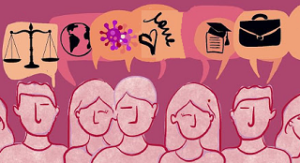 and idealism, arises from Socrates’ maieutics, a technique for valuing dialogue for the parturition (in sense of childbirth) of ideas that are consolidated according to the concrete conditions of knowledge (it is said material, but the Greek hilé is something different from matter today) where it is questioned what is unshakable and absolute.
and idealism, arises from Socrates’ maieutics, a technique for valuing dialogue for the parturition (in sense of childbirth) of ideas that are consolidated according to the concrete conditions of knowledge (it is said material, but the Greek hilé is something different from matter today) where it is questioned what is unshakable and absolute.
Among modern truths strongly influenced by Hegel, there is a high dose of subjectivism, said in the following way in Phenomenology of the Spirit: “… everything comes from understanding and expressing the true not as a substance, but also, precisely, as a subject. At the same time, it should be noted that substantiality includes in itself not only the universal or the immediacy of knowledge itself, but also that immediacy which is being, or the immediacy of knowledge. […] “, so it seems to refer to Being and Spirit, but it is subjective and fluid.
What resulted from Hegelianism was the formulation of the idea of Power exercised by the State and from it it will derive a large part of modern formulations, until reaching general relativism, that is, in rough terms “each one has his truth”, we return to the Greek doxa, mere opinion.
It is therefore necessary to discuss the method, but also modern methodologies are permeated with dogmatism, the mere repetition of abstract concepts, the logical-theoretical construction of formal theories, empiricism, according to Popper, the greatest modern danger, and idealistic rhetoric.
Hermeneutics initially and later the hermeneutic circle starting from Heidegger and consolidated in Hans-Georg Gadamer’s Truth and Method, reconstructs a modern maieutics, where not only the dialogue becomes viable, but also the possibility of a fusion of horizons becomes possible, including in dialogue with classical ontology and modern historicity.
The hermeneutic method has a profound relationship with life, Husserl’s lebenswelt, is effective for dialogue with different world views, thus it favors the relationship between people who express different cultures, and thus it is crucial for the interpretation of texts in the fields of law , theology and literature, without fundamentalism and false orthodoxy that hides error and doxa.
Hermeneutics in a pandemic relationship makes people act together even with a different visions about political, medical and social reading, it is it that helps distant discourses to show solidarity for life, the common good and in the near future outlines plans for the recovery new horizons of post-traumatic society.
#LockDown although late, in Brazil
Countries that performed a #LockDown earlier were successful not only in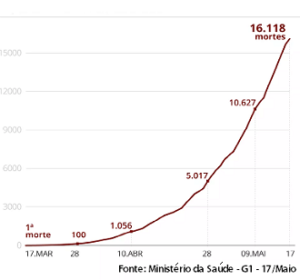 combating the coronavirus, as is the case in New Zealand and Slovenia, the first European country to not register any deaths by covid-19, but also had a return to new normality more early.
combating the coronavirus, as is the case in New Zealand and Slovenia, the first European country to not register any deaths by covid-19, but also had a return to new normality more early.
Even from an economic point of view it was better to take radical measures, to be able to resume earlier with social activities, as economic ones will have to be resumed gradually and in many cases they have already undergone radical changes, what are calling a new normal, cases like Sweden and South Korea (which is not true that it has not made strong restrictions on social isolation, although it is not a total #LockDown), have been isolated, but have a conscientious and organized people capable of complying with social rules.
Brazil already has some cities in the North and Northeast with a decreed #LockDown, in the Southeast it is more difficult both for the population volume and for a part of the population that insists on ignoring what stands out: the aggressiveness of the coronavirus and the death toll , in addition to the exhaustion of the health system.
We will enter a week of conflict, with another health minister leaving the central government, with measures to release the central government and restrictive measures by governors, in addition to the controversial use of hydroxychloroquine whose effectiveness has no scientific proof, in addition to the side effects.
The summary of the whole Brazilian problem is the impossibility of a rational discussion around a topic that affects the death of thousands of people, however, we continue to defend a #LockDown in the big centers, which are the main focuses of the virus in the country, so that the curve stops at a plateau, which is around 900 daily deaths, the number 485 on Sunday is underreported due to medical centers that cut staff on weekends.
We look forward to a very turbulent week, which, if not enough, is still more controversial in the political area, with a return to old practices already condemned by the society of physiologists, it is expected that governors and mayors will maintain a firm position in the face of the urgency of #LockDown
Society in a transient moment
Life has changed all over the planet, the limitations imposed will certainly not be permanent, but some concerns that were born with health, with the invisible and with new technologies will be permanent as to the importance and transformed when taking them more into account.
be permanent, but some concerns that were born with health, with the invisible and with new technologies will be permanent as to the importance and transformed when taking them more into account.
The transient also observes the idealistic dichotomies of subjects and objects, or subjectivity seen as a false model of the subject, that he is devoid of materiality or substantiality, the disease is a proof of this error, or of a false objectivity, our certainties about our empirical objects have failed and continue to fail in predictions and models, the old age of uncertainty, old because it has been a “theory” since the last century, now became narrative.
The old idealistic theories, which history made them fundamentalist ideologies, have as their epicenter the idea that we must develop and advance the economic models (in the end it is always the idea of “more production”) until an even greater exhaustion, before the nature and now of life itself on the planet put at pandemic risk.
Sloterdijk warns in an interview in El País “current life does not invite us to think”, and the reason that I have a relative optimism about social distance (I prefer isolation, as society as a whole works in a network), is in the reasoning he does in the same interview: “For Husserl and his phenomenology it was necessary to get out of the impetuous time of life, the most elementary device was to always take a step back. This action allows you to become an observer. ” .
And this is the basic assumption of uncertainty, that the observer is part of the phenomenon, the idea of science that we can repeat the experiment observing the phenomenon, must take into account that the observer is part of the phenomenon, in times of pandemic, if not me prevent pandemic affect.
The whole of this epoch change, since its foreshadowing came from the two great wars, which not by chance came from the worst pandemic that humanity faced was the Spanish flu, which is a good example when there is no social distance, which lasted 2 years (January 1918 to December 1920), infected a quarter of the planet (500 million people) and killed between 20 and 50 million people.
Two untruths exist about this pandemic, first #lockDown is not good (see numbers above) and that has not changed anything, it happened right at the end of the 1st. world war (from 1914 to November 1918) that had deteriorated Europe’s sanitary conditions and economic resources, but that’s when the League of Nations model emerged (installed in January 1919, shortly after the Versailles treaty), even though it insufficient to avoid the 2nd. world war, started the discussion of the basic principles of social rights.
Also the old truths about the invisible hand of the market, laissez faire, began to change, with the provident state, and after the 2nd. world war the UN with important departments like FAO, UNICEF and WHO itself, an organization of great influence now in World Health and that gives guidelines to face the pandemic.
So, after this war that is now a war for everyone, against an invisible enemy and one can still say unpredictable, there will be changes and they must be thought out globally, but we are in a transient where the old ideas still resist seeking the previous normality of a consumerism and a society of inhuman and unequal tiredness.
The new normality
When we have difficulty changing a routine that is essential to escape from dangers, the consequences are worse than those if we accept that a new routine has imposed itself.
dangers, the consequences are worse than those if we accept that a new routine has imposed itself.
Of course this implies a type of culture that for some historical reason or discipline already acquired by years of tradition helps at some point, that even though it is traumatic, it is possible to be socially incorporated as a “new normality”.
It is not by chance that the term appeared in Portuguese-speaking countries, where during the pandemic crisis it was often heard, the news reports and Brazilians traveling through Hispanic countries hear the exclamation “¡No es normal!”, but the translation into Portuguese comes from the English expression (from England and not from America): “new normality”, an expression that attests its incorporation as a new expression in the United Kingdom.
In eastern countries, if we observe in airports and in reports, even before the pandemic, the use of masks and a certain calm behavior in difficult situations show that the oriental discipline is already normal, I don’t know what expression they use, but social behavior is easily observable in the west.
At the height of the pandemic we prefer to say, everything will return to normal, which would be the same as saying we only admit “old normality”, I do not want to justify the irresponsible attitude of leaders and even governments that prefer not to admit the health crisis.
Now what we will have to adopt in some states and cities in Brazil, will be a new normality that admits the exhaustion of the health system and the peak of the pandemic, the good news is that everything indicates that we are close to the upper level and the curve already flattened may fall in number of dead.
We need to react culturally by incorporating a new normality, the philosopher Byung Chul Han calls it an excess of positivity, although it indicated the fact that society is always moving in the direction of acceleration, the expression may now seem more appropriate, because the opposite is not negativity, but the pandemic reality.
Countries that managed to slow the acceleration of daily life are already reaping results, some like New Zealand (which adopted an extreme #lockdown and the president became a national idol) reaped the fruit earlier, now without the pandemic.
Peak crisis and do not rush the future
We are at the peak of the crisis and we are already talking about the post-traumatic situation, there are many doctors and sociologists who want to hurry up an analysis, China emerged from the crisis, Europe begins the new stage in 3 distinct and elongated phases and Brazil and countries from the southern hemisphere winter is approaching.
situation, there are many doctors and sociologists who want to hurry up an analysis, China emerged from the crisis, Europe begins the new stage in 3 distinct and elongated phases and Brazil and countries from the southern hemisphere winter is approaching.
The analysis of the curve and the peak made by DataScience shows that the social distance was worth it, however, governmental hesitations and the approach of winter may even if the curve flattens, the data indicate that yes, it may be lengthened, that is, the “new normality” will be delayed.
The name “new normality” already excludes all analyzes that indicate any impossibility of returning to the previous stage, that is, an agitated and unprotected life, what Edgar Morin calls everyday “intoxication”, and an accelerated economic development, with its added price.
The moment in Brazil and I believe that most countries in the southern hemisphere is to create even tighter conditions to disadvantage “social relaxation”, in a way even understandable since the quarantine if it were even 40 days, it would be running out, everything indicates not. To further complicate political crises, in the Brazilian case, they deepen and seem to have no end, the problem of governability and political instability accelerates and deepens the health crisis.
Concentrating our efforts and focusing only on the health crisis, the economic and the social exist, however, they should not justify deaths and crisis in health care, we must consider that we are at the upper level of the curve, and the numbers seem to stabilize, they are high, it is true, if if we take #lockDown seriously we could already be seeing a way out, but that’s not the case.
One of the consequences of the pandemic is the so-called Kawasaki Syndrome, in England for example, the Health System (NHS, the acronym in English) has already detected an increase in the number of children with multisystemic inflammation, gastrointestinal problems and physical inflations.
In the middle of spring, but already with signs of summer, Europe will gradually return to activities, and we will be able to see how the social and economic problems will be faced, here is the future.
The way up
For both faith and science, the way up is to contemplate the truth and as the philosopher of science Karl Popper proposes, treading the path of falsifiability and science as a human project, is not impassive of transformation, that is why several theories arise.
philosopher of science Karl Popper proposes, treading the path of falsifiability and science as a human project, is not impassive of transformation, that is why several theories arise.
However, the arrogance and use of authoritarianism is incompatible with faith, the Encyclical Veritas Splendor of John Paul II, next to the affirmation of faith also establishes in paragraph 39: “Not only the world, but man himself was entrusted to his own care and responsibility. God left him “left to his own decision” (Sir 15, 14), so that he could seek his Creator and freely reach the perfection Achieve. it means personally building up such perfection ”, it is not a matter of Platonic perfection.
But rather the rise that Teilhard Chardin proposes, it is, therefore, a path and not a state, so there are people capable of external attitudes, but without values. Dialogue can be established in these circumstances, and there are certain issues, such as medicine and many other professions, that the truth, or the verification of falsifiability as proposed by Popper, must be verified by science.
A comment on the faith, it is interesting that the Risen Jesus who appears after Easter, goes to bake a fish, talk to Thomas who doubts that he would be alive, exhort the disciples, but there is no demonstration of spectacles or miracles in him.
The Enlightenment intended to present its light, but it is in the Heideggerian “clearing” that modern philosophy found a way, the ontological resumption, and only through it can one better get out of the pandemic crisis, look at an earthly world where the Being lives.
We have to walk in the light, but with everyday life and not reject the truth, but the path of falsifiability, that is, proposing that some assertion is false until it proves its truth is a safe path for science and faith it is not blind, otherwise it gives no real hope.
The crisis of Western thought and the pandemic
Old analyses still grounded in idealism, which study the state model, economic problems and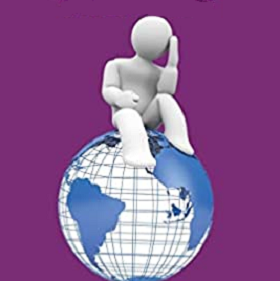 anthropocentric models do not account for the new reality, the global pandemic was caused by a virus and caught every society unprepared.
anthropocentric models do not account for the new reality, the global pandemic was caused by a virus and caught every society unprepared.
The net analyses continue with discourses about obviousness, we are one planet, the problem is everyone’s, we have to review values, etc. but those that point to the future still live in the dimness of a thought about ideals that have been exhausted, but not the discourses.
Edgar Morin, who has long been pointing to a planetary citizenship, approaching 100 years and keeping a lucid head, in an interview with the L ́Observateur of 03/18 said: “Confinement can help us detoxify our way of life”, and in the same interview points out that “this crisis shows us that globalization is an interdependence without solidarity”, and that it has produced a techno-economic unification of the planet.
In the same vein Byung Chul Han wrote in the Society of Tiredness, that we are all in active life and ignore contemplative life, however the pandemic has taken us out of activism and we still do not know what to do with the “idleness” of staying at home, there is even religious discourse that calls it a tomb, but we will talk about it when we speak of the night of God and the instrumentalized religiosity of today.
To those who do not believe in this analysis, I remember that successful programs like “reality show” are now in fact realities because each one lives in his home, and “master chef” now has to happen in practice in families because restaurants are closed.
As for the technological aspect pointed out by Morin we can not forget that in addition to the global news, now for work, for education and even for leisure videoconferences are now realities, there are still those who curse against them, but it is schizophrenia because they are now necessary and even to maintain trade are indispensable, online shopping are there.
The detoxification of our way of life did not come through a plan of government, nor by a great cultural change, although the pandemic suggests this, even in our homes we still seek the unrealities of contemporary life, the pandemic, however causes a change of this vision.
The East and some countries, I quote the case of Portugal, are succeeding because of a certain discipline in the #StayAtHome when Peter Sloterdijk in The rules for the human park spoke about the failure of “human domestication”, did not imagine that a virus could demonstrate its thesis, will come out of the crisis early and will have fewer dead countries with greater social discipline.
Finally, Social Networks (not to be confused with the techno media we talked about above), the dynamics of the spread of the virus follows the logic of networks, and so if these studies are taken seriously we may be more ready in the defense of lives, not by chance the infectologist Carl Latkin is one of the scientists with the greatest publication in this subject.
The “war” and pandemic economies
The only economic model we have of a situation in which the productive forces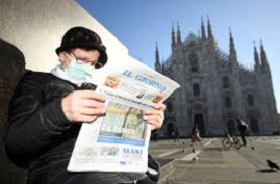 of society are disorganized by the impossibility of going to work or by the effort concentrated in another activity is the “war” economy, however there is a difference because it is not war between peoples , the enemy is now a virus that has the power to do a war-like damage.
of society are disorganized by the impossibility of going to work or by the effort concentrated in another activity is the “war” economy, however there is a difference because it is not war between peoples , the enemy is now a virus that has the power to do a war-like damage.
John Kenneth Galbraith wrote after the September 11 attacks, believing in a possible war, that “in a war economy, the public obligation is to do what is necessary: to support the military effort, to protect and defend the national territory, and especially to maintain the physical well-being, solidarity and morale of the population ”.
Of course, military effort can be exchanged here for medical effort, but it is already happening because not all productive forces are disorganized, the reorganization of oeconomicus, the initial meaning in ancient Greece that gave rise to the word economy, that is, the domestic economy. However, the social economy must reorganize, still in a period of pandemic, paralyzed sectors such as domestic tourism, the light and heavy mechanics industry and the consumer goods industry can be rethought around the “war effort”, in several countries to the auto industry has been called to make and restore hospital equipment, and hotels are used to house some homeless people, in short it is possible to rethink some things.
Volunteers working in needy communities are also an important effort, clothing stores can make clothing and masks to help the population, probably this should continue after the pandemic, as shown by eastern countries, the use of masks is common in Japan and some eastern countries. Family spaces should also be rethought, personally I have always built an office outside or isolated in the home environment, an American report went viral that the reporter’s wife enters his current office to remove the children.
We also did not make monthly purchases, of course, storage has a perverse side of being able to increase or even disappear some products, as happened in Brazil with milk, and the gas cylinder apparently has some speculation at stake, but we must reorganize the economy of the “Neighborhood” where people can travel less and make monthly purchases.
The main thing is to overcome an “economocentric” model and think of a biocentric one, I prefer the anthropocentric one because pets and nature must also be thought of in the social relationship.
There is a “paschal” side not only for the period we live in, but for the number of deaths and the struggle to reduce this number, in those who have sensitivity there is a feeling of death, but the struggle for life, the essential thing is the bread of each day and the resurrection to come gives this paschal environment.
Healing the Other
The psychologist Carl Jung gives an expanded sentence of what many have already said,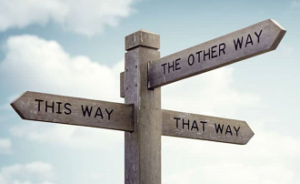 among them Gandhi: “You cannot hurt the other without hurting yourself”, thus also added Jung: “he who heals the other, heals himself”, in times of pandemic it is good to think this.
among them Gandhi: “You cannot hurt the other without hurting yourself”, thus also added Jung: “he who heals the other, heals himself”, in times of pandemic it is good to think this.
Fools say, the older and the sick are the group at risk this would happen, but more people infected and greater is the social contagion, and more people outside the “risk group” are affected, we are at an exponential moment in the Americas, it’s time to take care of yourself.
The economies are collapsing it is true, but along with it the idealistic models that have been in crisis for a long time, the agony came due to the fragility in which they found themselves, it is not this or that model, all current models are centered on “Economy” and development, sustainable development was invented for a time, but nature has shown that this model is unsustainable and resources are exhaustible.
Let us return to disease, the source of current blindness, and the prolongation of the cultural crisis and night of God, the appeals and prophecies are not lacking everywhere, they want signs and miracles as in the Jewish culture of the time of Jesus, but the sign is there and it is the blindness that prevent us from seeing.
The crisis was in the media, or in networks that are different things, now they are the lifeline to keep in touch with the proper distance, to keep companies and schools running, they were not evil.
Of course not, the loss of relationships does not depend on the means (the media) we use, and putting ourselves in a network now seems clearer, it is putting ourselves first in front of those closest to us, taking care of and taking care of them, things that we remember to do for our grandparents, who seemed closed and backward.
Saving the economy even if people die, that is the foundation of a world where, at bottom, the economy that everyone was concerned about, maybe a minority really thought about the well-being and balance of life lived in essence, without luxury and with a certain “ comfort”.
Due to the circumstances we have to think like this, after all the oecomicus (in Greek: Οικονoμικός), by the writer Xenofonte is a Socratic dialogue that deals with the domestic economy and agriculture, yes the economy has evolved, but nobody should have lost its origins, after all no one went to the malls, but to the markets to buy food and be able to #StayAt home.
A dark night of humanity
One night falls on mankind, but it must be noted that this night the virus that  has hit the whole planet has been happening is a catalyst and despite being lethal and bringing a lot of care can wake us up from a night that was happening: night of culture, night of God, night of science reduced to questionable specialties and methods and mainly night of man.
has hit the whole planet has been happening is a catalyst and despite being lethal and bringing a lot of care can wake us up from a night that was happening: night of culture, night of God, night of science reduced to questionable specialties and methods and mainly night of man.
The rampant and often meaningless life, the search for efficiency and productivity, the idea that economic growth brings happiness and especially the exclusion of the Other, now seem to be inverted with the need to stay at home: #StayAtHome.
Tonight provoked a collective blindness, culture is anything goes, scribbles and blots became art, purely genital expressions without any affectivity of sex, and the religious culture that helped people find peace of mind became pure superstition, appeal wealth and money, or mere poverty on the other hand without anything to make you understand the deep sense of detachment and living in the essence of life.
The religious night or night of God is an attachment of men to their closed circles now, if they are prudent, also prevented from meeting, gross manipulation, fundamentalist reading of the Bible, which are the worst contemporary blindness, also reduces man to being-for-death and not being-for-life.
Contemplate the mystery of the universe beyond what we already know, we know little of the mass and dark energy that makes up 94% of the universe, and that it may still have one beyond its “bubble”, it can open the eyes of those who think they know everything because they learned science, or because they read the Bible with their eyes of cultural blindness and their closed and petty circle of “elect”.
When Jesus heals the blind man, he scares the Pharisees who want the blind man to shut up, science helped a little this abandonment of superstitions and helped to illuminate human intelligence, also put to the test by the virus, in the biblical passage we read in John 9: 7- 9:
And [Jesus after putting clay in his eye] said to him: “Go and wash yourself in the pool of Siloam” (which means: Sent). The blind man went, washed and came back seeing. The neighbors and those who used to see the blind man – because he was a beggar – said: Isn’t he the one who kept begging? Some said: “Yes, it’s him!” Others said: “It is not him, but someone like him”.
However, he said: “It is me!”, And the religious wanted to forbid him to speak.

